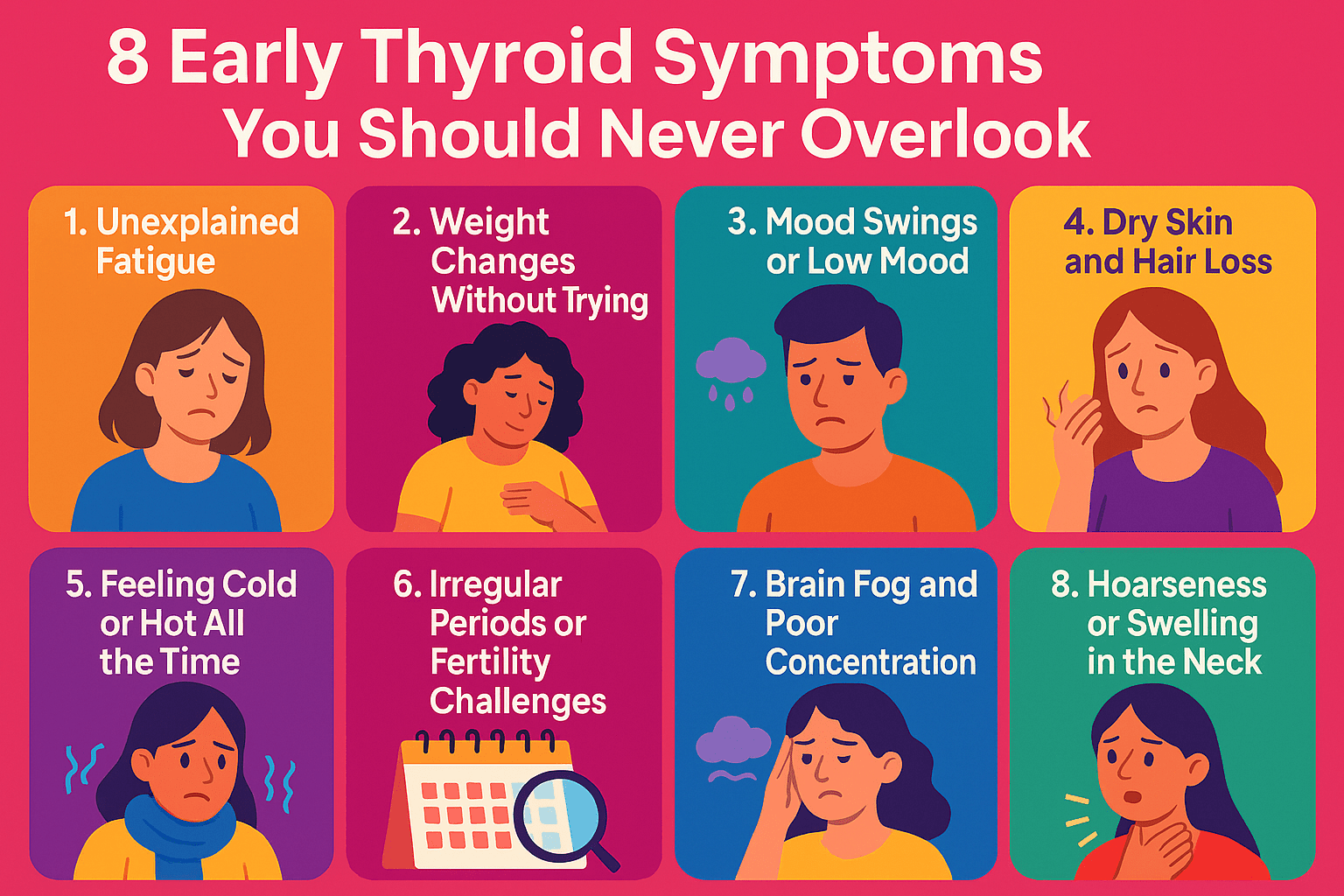Before It Gets Worse: Early Thyroid Symptoms You Should Never Overlook
Have you ever felt drained, no matter how much rest you get? Or noticed your weight changing for no clear reason? Perhaps your mood has been up and down, and you’ve chalked it up to stress or age?
These may not be just everyday fluctuations; they could be early signs of thyroid problems.
Millions of people are living with undiagnosed thyroid disorders, often for years. Why? Because the early symptoms of thyroid issues are subtle, misleading, and frequently ignored or misinterpreted.
Let’s uncover the silent signs of thyroid trouble before it gets worse.
Why Your Thyroid Matters More Than You Think
Your thyroid gland, small and butterfly-shaped, sits at the front of your neck. But despite its size, it plays a crucial role in your well-being. It controls your metabolism, body temperature, energy levels, heart rate, and even mental clarity.
When it’s not functioning properly, whether underactive (hypothyroidism) or overactive (hyperthyroidism), it throws your whole system off balance.
That’s why it’s so important to catch thyroid disease warning signs early on.
8 Early Thyroid Symptoms You Should Never Overlook
If you experience two or more of these symptoms regularly, don’t ignore them. These could be signals of underactive thyroid symptoms or other related issues.

1. Unexplained Fatigue
This isn’t just feeling tired after a long day. Thyroid-related fatigue is persistent and heavy, like you’re walking through mud. Even with rest, your body never fully recharges.
2. Weight Changes Without Trying
Gaining weight despite a healthy diet and regular exercise? Losing weight rapidly with no explanation? Both could be signs of a hormonal imbalance due to thyroid issues.
3. Mood Swings or Low Mood
Thyroid problems directly affect brain chemistry. An underactive thyroid can cause low mood and depression, while an overactive one may lead to anxiety, restlessness, or irritability.
4. Dry Skin and Hair Loss
If your skin feels unusually dry, or you’re losing hair from your scalp or eyebrows, it might be more than a cosmetic concern. These are often early indicators of hypothyroidism.
5. Feeling Cold or Hot All the Time
Feeling cold when everyone else is fine? Or overheating easily? This temperature sensitivity is one of the clearest signs of thyroid imbalance.
6. Irregular Periods or Fertility Challenges
Especially in women, thyroid dysfunction can disrupt the menstrual cycle or even lead to difficulty conceiving. Thyroid symptoms in females are often misdiagnosed as gynaecological issues.
7. Brain Fog and Poor Concentration
Struggling to remember things or focus clearly? Brain fog is a common but frustrating symptom, particularly with an underactive thyroid.
8. Hoarseness or Swelling in the Neck
If your voice feels hoarse for no reason or you notice a swelling (goitre) in your neck, it could be a physical sign that your thyroid is enlarged or inflamed.
Why People Overlook Thyroid Symptoms
The tricky part? These symptoms mimic everyday stress, ageing, or lifestyle issues. You might say:
- “I’m just getting older.”
- “It’s probably my work stress.”
- “Everyone feels tired sometimes.”
But when symptoms persist—or show up together—they’re worth paying close attention to.
When Should You Get Your Thyroid Checked?
If several of these signs sound familiar, consult your GP. A simple blood test (TSH, T3, T4) can assess your thyroid hormone levels. It’s quick, widely available through the NHS or private clinics, and can diagnose:
- Hypothyroidism
- Hyperthyroidism
- Hashimoto’s thyroiditis
- Graves’ disease
Early detection means better treatment options, fewer complications, and a faster return to feeling well.
The Power of Early Action
Addressing thyroid issues early can prevent long-term problems like:
- Heart disease
- Infertility
- High cholesterol
- Osteoporosis
- Mental health struggles
In most cases, treatment is straightforward, usually in the form of daily tablets (such as levothyroxine) and routine monitoring.
Listen to Your Body Before It Screams
You know your body best. If something feels “off,” it’s not overreacting—it’s self-awareness.
Your body whispers before it screams. Don’t wait until it’s shouting.
Check the signs. Get tested. And share this knowledge—it could help someone else before their symptoms spiral.
Our Doctor

Director
Dr. Sarfaraz Nawaz Ahmed
Diabetologist | Rheumatologist | Consultant Physician
Education:
- MBBS: Jawaharlal Nehru Medical College (JNMC), Sawangi, Wardha (1995-2002).
- FCPS (Medicine): College of Physicians and Surgeons (CPS), Mumbai (2006-2009).
- MD (Medicine): USAIM (2006-2009).
- Postgraduate Diploma in Rheumatology
Experience:
- 20+ Years of Experience in Internal Medicine, Diabetes & Rheumatology








.svg)
.svg)



